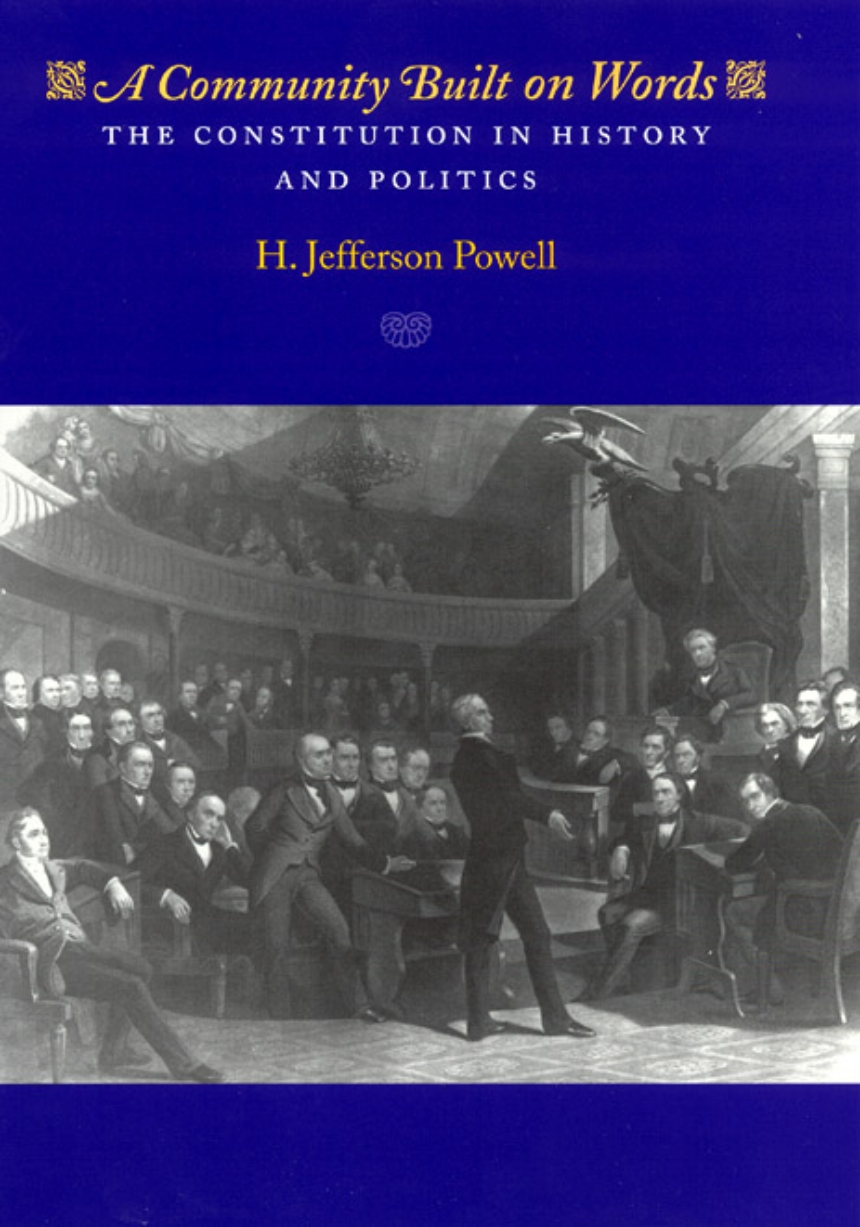A Community Built on Words
The Constitution in History and Politics
9780226677248
9780226677231
9780226677224
A Community Built on Words
The Constitution in History and Politics
H. Jefferson Powell offers a powerful new approach to one of the central issues in American constitutional thinking today: the problem of constitutional law’s historicity, or the many ways in which constitutional arguments and outcomes are shaped both by historical circumstances and by the political goals and commitments of various actors, including judges. The presence of such influences is often considered highly problematic: if constitutional law is political and historical through and through, then what differentiates it from politics per se, and what gives it integrity and coherence? Powell argues that constitutional theory has as its (sometimes hidden) agenda the ambition of showing how constitutional law can escape from history and politics, while much constitutional history seeks to identify an historically true meaning of the constitutional text that, once uncovered, can serve as a corrective to subsequent deviations from that truth.
Combining history and theory, Powell analyzes a series of constitutional controversies from 1790 to 1944 to demonstrate that constitutional law from its very beginning has involved politically charged and ideologically divisive arguments. Nowhere in our past can one find the golden age of apolitical constitutional thinking that a great deal of contemporary scholarship seeks or presupposes. Viewed over time, American constitutional law is a history of political dispute couched in constitutional terms.
Powell then takes his conclusions one step further, claiming that it is precisely this historical tradition of argument that has given American constitutional law a remarkable coherence and integrity over time. No matter what the particular political disputes of the day might be, constitutional argument has provided a shared language through which our political community has been able to fight out its battles without ultimately fracturing.
A Community Built on Words will be must reading for any student of constitutional history, theory, or law.
Combining history and theory, Powell analyzes a series of constitutional controversies from 1790 to 1944 to demonstrate that constitutional law from its very beginning has involved politically charged and ideologically divisive arguments. Nowhere in our past can one find the golden age of apolitical constitutional thinking that a great deal of contemporary scholarship seeks or presupposes. Viewed over time, American constitutional law is a history of political dispute couched in constitutional terms.
Powell then takes his conclusions one step further, claiming that it is precisely this historical tradition of argument that has given American constitutional law a remarkable coherence and integrity over time. No matter what the particular political disputes of the day might be, constitutional argument has provided a shared language through which our political community has been able to fight out its battles without ultimately fracturing.
A Community Built on Words will be must reading for any student of constitutional history, theory, or law.
261 pages | 6 x 9 | © 2002
Law and Legal Studies: Legal History, The Constitution and the Courts
Political Science: American Government and Politics
Table of Contents
Preface
Introduction
Part One
I. 1790: Secretary Jefferson and the Foreign Affairs Power
II. 1791: The National Bank and the Point of Interpretation
III. 1793: The Supreme Court and the Metaphysics of Sovereignty
IV. 1794: Kamper v. Hawkins and the Role of the Judiciary
V. 1798 (1): Justice Paterson and the Missing Fundamental Principle
Part Two
VI. 1798 (2): How to Think about the Sedition Act
VII. 1800: Marshall and the Role of the Political Branches
VIII. 1802: How Not to Think about the Judiciary Repeal Act
IX. 1804: Turpin v. Locket and the Place of Religion
X. 1806: Hudgins v. Wright and the Place of Slavery
XI. 1808-1809: A Forgotten Crossroads in Constitutional History
Part Three
XII. 1817: President Madison Vetoes His Own Bill
XIII. 1818: The Congress Thinks about Internal Improvements
XIV. 1821: The Attorney General and the Rule of Law
XV. 1829: Writing State v. Mann
Part Four
XVI. 1859: The Supreme Court and the Metaphysics of Supremacy
XVII. 1862: Four Attorneys General and the Meaning of Citizenship
XVIII. 1873: Slaughterhouse Revisited
XIX. 1904: Clay May, the Railroad, and Justice Holmes
XX. 1927: Justice Brandeis and the Final End of the State
XXI. 1944: Constitutional Injustice
Part Five
XXII. 2001: Common Ground after Two Centuries
Conclusion
Notes
Index
Introduction
Part One
I. 1790: Secretary Jefferson and the Foreign Affairs Power
II. 1791: The National Bank and the Point of Interpretation
III. 1793: The Supreme Court and the Metaphysics of Sovereignty
IV. 1794: Kamper v. Hawkins and the Role of the Judiciary
V. 1798 (1): Justice Paterson and the Missing Fundamental Principle
Part Two
VI. 1798 (2): How to Think about the Sedition Act
VII. 1800: Marshall and the Role of the Political Branches
VIII. 1802: How Not to Think about the Judiciary Repeal Act
IX. 1804: Turpin v. Locket and the Place of Religion
X. 1806: Hudgins v. Wright and the Place of Slavery
XI. 1808-1809: A Forgotten Crossroads in Constitutional History
Part Three
XII. 1817: President Madison Vetoes His Own Bill
XIII. 1818: The Congress Thinks about Internal Improvements
XIV. 1821: The Attorney General and the Rule of Law
XV. 1829: Writing State v. Mann
Part Four
XVI. 1859: The Supreme Court and the Metaphysics of Supremacy
XVII. 1862: Four Attorneys General and the Meaning of Citizenship
XVIII. 1873: Slaughterhouse Revisited
XIX. 1904: Clay May, the Railroad, and Justice Holmes
XX. 1927: Justice Brandeis and the Final End of the State
XXI. 1944: Constitutional Injustice
Part Five
XXII. 2001: Common Ground after Two Centuries
Conclusion
Notes
Index
